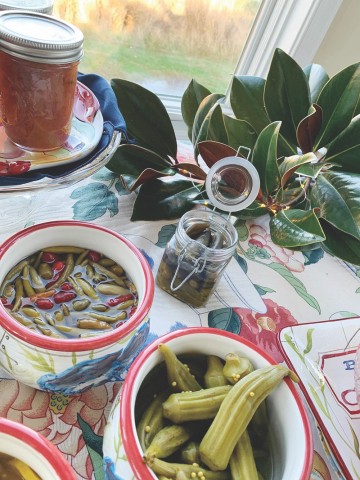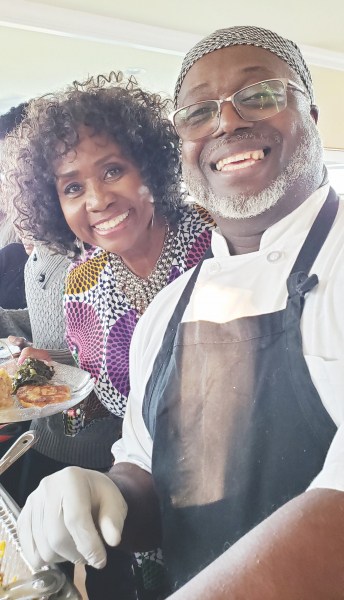Sharing a Gullah Feast
Thanksgiving is by tradition a gathering of people for a feast that shares their cultures.
If you come from Daufuskie (say Daw-Fo-skee) Island, as Shady Sider Emily Bryant does, you’d be sharing Gullah culture in such Low Country dishes as Daufuskie deviled crabs and Gullah stew.
Gullah people had their beginnings in America in 1700. After the Civil War, former enslaved people settled many sea islands tucked in the coasts of North Carolina, South Carolina and Georgia. Daufuskie, measuring only eight square miles, is one of them.
When Bryant lived there as a child in the 1940s and ’50s with her grandmother, it was home to not more than 100 families. The island had no electricity, running water, shops or paved roads. Bartering was a way of life. People with cows shared milk with those who did not have cows, those who had a wonderful catch of fish or shrimp or crab, shared with those who could not fish. If there was a celebration, everyone on the island came.
“We spoke Geechee,” Bryant said. “English was practically a second language.”
Columbia Beach, the Shady Side community Bryant now calls home, was founded much more recently, in the 1940s, by African Americans seeking a weekend beach for their families.
Though separated by 596 miles, the water communities have much in common.

Nature surrounded Emily on an island laden with huge oak trees covered in Spanish moss. Marshlands surround Columbia Beach much like Daufuskie and Hilton Head in the 1950s. Eagles and osprey, herons and all kinds of songbirds fill Columbia Beach skies. Sitting on the beach in Daufuskie, Will Bryant has seen “a mile of dolphins swim by.” In Columbia Beach, Emily and I have seen dolphins from our decks.
Best of all is the sense of community both places share. Both still live by Emily’s grandmother’s words: “if you forget your past, you have no future.”
So Columbia Beach was a good place for the Gullah feast Bryant served this month to bring people together for a cause: for “fun-d raising” for the Arlington Chapter of the Links, Inc, a group that supports college scholarships and funding for women’s health initiatives.
“Today we will share the Daufuskie deviled crab on the half-shelf,” said Chef Milton McGee, an import from St. Johns, South Carolina, introducing a traditional blending of crab and spices — today with oyster crackers standing in for the historic ingredient, Uneeda crackers.
Next came Gullah stew, a combination of shrimp, sausage, ham, chicken, lots of okra, green pepper and a tomato base of Bloody Mary juice and chopped fresh tomatoes.
Oysters, crabs and fish are just as much a part of Gullah culture as they are of Chesapeake culture. As a child, Emily recounted, “I didn’t know the Atlantic was an ocean. I thought it was a river, and we fished every day.”
Shrimp were so plentiful in the Daufuskie marshland that everyone scooped them up in a croaker or burlap sack. When the tide went out, Emily said, “you scooped the crabs out of the bottom of the river.” Without refrigeration, the people ate — or fed to the pigs — whatever they caught that day.
Pigs were the favored meat because pork could be cured and kept.
Every garden had bushes of okra, peppers and tomatoes. Okra was a crop that came with the slaves from Africa and in the Low Country environment, it thrived.
As some 50 guests from both sides of the Bay, Maryland, Virginia and D.C. ate with Emily and her husband Will, friend and colleague, former South Carolinian Tilly Blanding sang Gullah songs.

“I am from the battlefield for justice,” she said in her introduction, noting in her eighth grade year, she’d been arrested 17 times for protesting in the Civil Rights movement.
She began with “Hold On,” prompting a call and repeat from the guests. She reported that “Kumbaya” has finally been credited to the Gullah people. Next came “Wade in the Water” a song that I, a South Dakotan, knew from high school choir. She reminded the guests that the songs all had a deeper meaning. This one describes how escaping slaves would wade in the water to throw off slave masters and their dogs.
In the second chorus, Chef Milton’s deep, rich bass joined in. After the singing, he told the story of “Go Ahead,” a song sung to him by his grandparents and great-grandparents. It was a family way of teaching to not let bad times, bad treatment, hold you down. The melodic songs created a shared experience in the guests — we all knew the songs — either from family lore or the Civil Rights movement.
Then came the buffet. Seven main dishes greeted us: smoked oysters and grits; smothered chicken; garlic-roasted salmon with Caribbean rice; collard greens with smoked turkey; candied yams with baby carrots; and a cornbread flatbread. There were side dishes of boiled peanuts, pickled pigs feet, red rice and hoppin’ John. Emily had imported homemade wine and ’shine as well.
On Daufuskie, all the cooking was done on top of the stove because without electricity there was no way to regulate oven temperature. In the hot summer, or green season, peanuts were boiled and then salted rather than roasted. From the first settlements, rice was grown on the island and accompanied every meal in variations of thickness, spicing and added ingredients. Yams were a staple because they held over the winter. Pig feet because they used every part of the pig. Every garden had collard and turnip greens.
My favorite dish was the oysters and grits — I have never been a fan of grits, but I’d never had them this creamy and subtly flavorful.
Dessert was a spread of many tastes and textures: blackberry dubee, peach cobbler, almond cake and praline. The dubee is made from blackberry juice, squeezed and strained to remove all the seeds and then layered with the dumplings. It tasted like summer. The sweet muddy tea and all the desserts were as sweet as the success of the fundraiser: $7,600.
With 16,000 members in 42 states, the Bahamas and the United Kingdom, Links is one of the nation’s oldest and largest volunteer service organizations. The mission is combining friendship and community service.
Our next project,” said Arlington Virginia Chapter president Diane Harley, “will be a career fair to showcase STEM (science, technology engineering and math) career opportunities for young women.”
For more information: www.links.inc; www.arlingtonlinks.inc.
